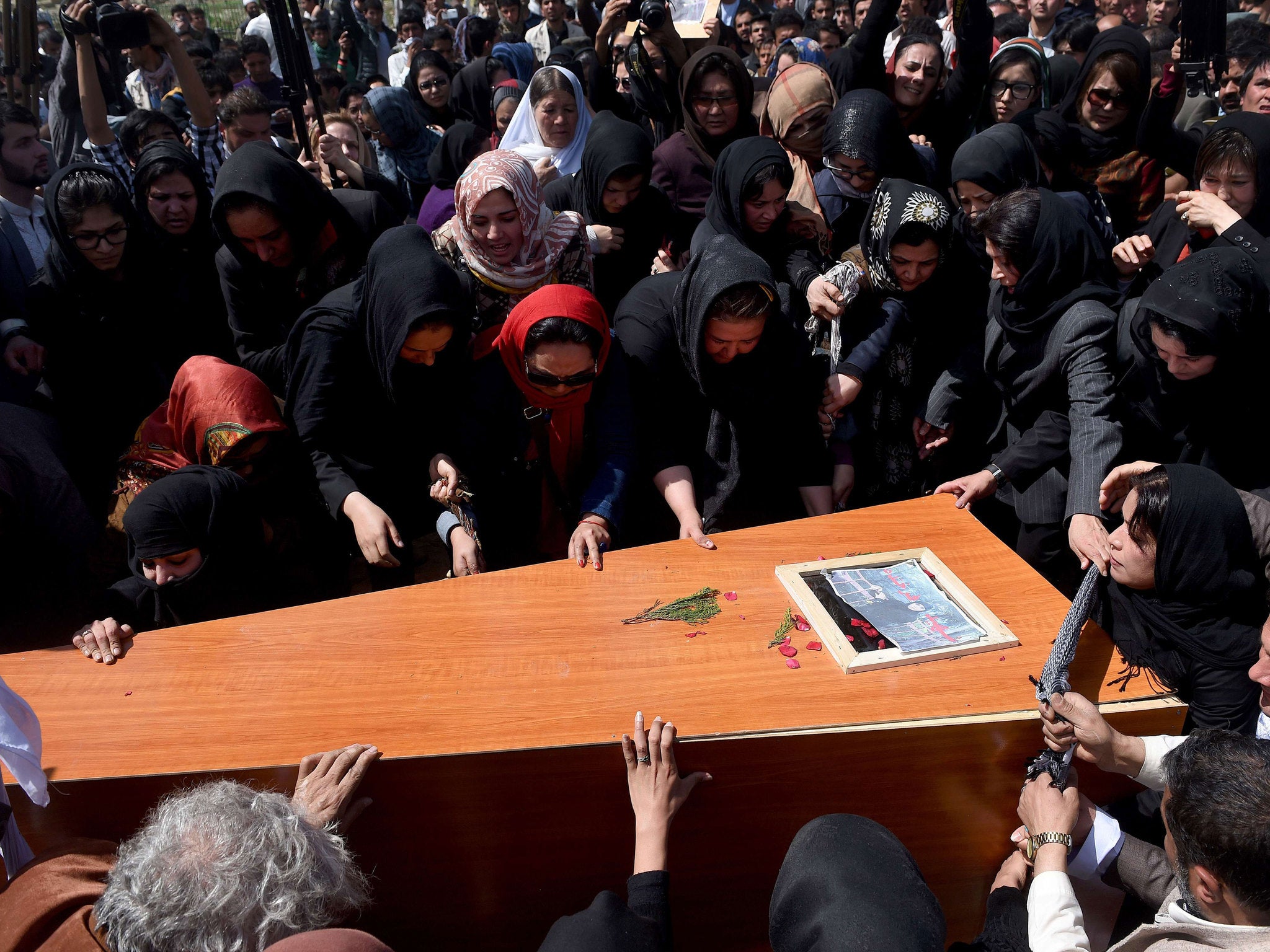Women break with tradition in Afghanistan to help bury 'completely innocent' Farkhunda who was beaten to death by Kabul mob
A mob beat the 27-year-old woman to death before throwing her body off a roof, running it over with a car, setting it on fire and then throwing it in a river

The burial of a woman who was brutally killed in Kabul for allegedly burning a copy of the Koran, saw Afghan women break with tradition on Sunday and help to carry the 27-year-old’s coffin to its final resting place.
The woman, now named as Farkhunda, was beaten to death by a mob in Kabul last week following accusations she had burned a copy of the Koran. The mob of men threw her body off a roof after beating her, ran over it with a car, set it on fire and then threw it into a river next to a well-known mosque in their brutal attack.
Farkhunda, a veiled woman who had just finished a degree in religious studies and was about to take up a teaching post, had got into a dispute with a group of men who sold amulets at the Shah-Do Shamshera shrine, her family said. She had told women not to waste their money on the amulets, calling the sellers parasites.
Her father, Mohammed Nadir, said the men responded by claiming Farkhunda had torched the Koran, causing people to believe she was “not a Muslim” and for her to be beaten to death.
But authorities have been “unable to find any singly iota of evidence to support claims that she had burned a Koran,” the country’s top criminal investigator, General Mohammed Zahir said.
“She is completely innocent,” he added, revealing that 13 people had now been arrested in connection with the killing, including two men who sold amulets. Thirteen policemen have been suspended pending investigation following allegations members of the force stood by and did nothing to stop the attack from happening last Thursday.
Farkhunda’s funeral was broadcast live on Sunday and was addressed by politicians, officials and senior police officers. Hundreds of people gathered at the graveyard chanting “we want justice” while the women who attended to help bury her carried the coffin from an ambulance to an open-air burial ground and finally her grave.
The women attendees, who are usually excluded from these rituals, were surrounded by a group of men who had formed a chain to offer them protection and support as they carried Farkhunda’s coffin.
Farkhunda’s brother Najibullah told the crowd: “She is a sister to you all, and it is your duty to bury her.”
Najibullah said he is changing his second name to Farkhunda in memory of his sister, and denied media reports his sister had been mentally ill. He said this claim was a made-up defence by his father, who had wanted to protect his family after police told them to leave the city for their own safety.
President Ashraf Ghani, now in Washington on his first state visit to the United States since taking office in September, condemned the killing as a “heinous attack” and ordered the current investigation.
Activists have condemned the killing, calling for justice for Farkhunda and for women in Afghanistan.
“We want justice for Farkhunda, we want justice for Afghan women. All these injustices happening to Afghan women are unacceptable,” a prominent women’s rights activist, known as Dr Alima, said.
“In which religion or faith is it acceptable to burn a person to death? Today is a day of national mourning and we will not keep quiet.”
Despite the end of the Taliban’s rule in 2001 following the US-led invasion of Afghanistan, and the supposed end to the restrictions placed on women under the previous regime, activists claim women are still treated as second-class citizens.
In pictures: Afghan women fight for their rights to take seats in parliament
Show all 10Under the Taliban, women could neither attend school nor work, and were forbidden from leaving the house without a male guardian.
While the last decade has seen much progress, with millions of girls now attending school and women entering employment, particularly in major cities, some rural areas have seen little changed and hard-won rights are at risk of being reversed as aid and foreign troops are withdrawn.
Additional reporting by agencies
Subscribe to Independent Premium to bookmark this article
Want to bookmark your favourite articles and stories to read or reference later? Start your Independent Premium subscription today.

Join our commenting forum
Join thought-provoking conversations, follow other Independent readers and see their replies